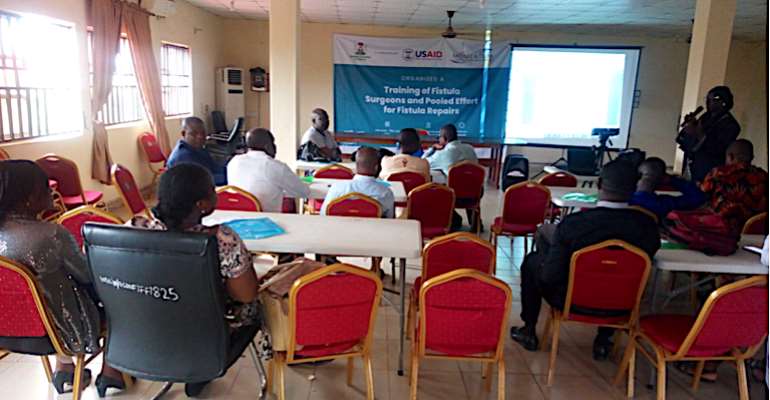USAID-MOMENTUM, FMH Undertake Free Training, Repair of VVF Patients in Ebonyi.

MOMENTUM, A United State Agency For International Development - funded International health partner, in collaboration with Federal Ministry of Health, Nigeria is set to repair over 20 Obstetric Fistula patients free in Ebonyi State.
The development was part of a 3-week training on Obstetric Fistula management and treatment for some medical Doctors in the State.
The training which kicked off on Monday at the National Obstetric Fistula Centre, Abakaliki, Ebonyi State Capital, targeted 15 surgeons.
Speaking to our correspondent at the venue of the event, the Clinical Specialist for Momentum Safe surgery Project in family planning and Obstetrics, Dr Bartholomew Odio, decried the high prevalence of Vesicovaginal fistula cases in Nigeria in general, and Ebonyi State in particular.
He noted that inadequate specialist doctors in the field has continued to pose serious challenge in fistula treatment and management in the country, adding that the training was aimed at building the capacity of the doctors to help tackle the menace.
Odio explained: "Momentum Safe surgery Project in family planning and and Obstetrics is a USAID- funded project implemented by Engender Health.
"Our three focus areas include Safe ceaserian surgery, Fistula prevention and management and female genital mutilation prevention and management.
"Nigeria has fistula prevalence of about 150, 000 cases, with annual incidence of about 12,000.
"About 20 facilities where Fistula repair is being done, every year, they repair about 5,000 cases.
"So, you can see that at that rate, it will take us up to 30 years to finish the backlog, talk less of the new ones.
"The Federal Ministry of Health developed a training manual to train doctors and nurses.
"We are here in collaboration with the Federal Ministry of Health, and also the State government to test run that manual.
"We are training about 15 Doctors on how to repair fistula.
"Also, we are going to use this opportunity to repair fistula cases, and we are planning to repair between 20 and 25 cases during this period."
The Lead facilitator in the training, and the Project Director, Evangel Vesicovaginal Fistula Centre, Associate Professor Sunday Leman, observed that the major cause of fistula in Nigeria was prolonged and obstructed Labour.
Leman said: "When women go into labour and stay for much longer time, two to three days, it leads to devitalization of tissues around the bladder and the vagina which could degenerate, leading to leakage of urine.
He however, noted that the high prevalence of fistula in Ebonyi State particularly, was due to surgeries by quacks and inexperienced medical practitioners, and advised women to avoid patronizing quacks for Caesarean section.
"But specifically in Ebonyi State, studies have shown that caesarean section is the main cause of fistula.
"Where the Doctor is qualified, appropriate medical equipments may be lacking.
"That often result to complications leading to fistula" Leman stressed.
The Lead facilitator who said he was designated by the Federal Ministry of Health and International partners to produce the training manual, further noted that the training has both the theoretical and practical sessions which would be used to repair the fistula patients.
The representative of the Federal Ministry of Health, Joy Angwa, explained that the training manual was developed with support from UNFPA and the West African Health Organization, while Engender Health was collaborating with the Ministry to pilot the training with the document.
"The essence is to identify and fill possible gaps, so that at the end of this training, it will be a generally acceptable as a national training document for doctors and nurses on Obstetric fistula, Angwe said.
Angwe, from the Fistula branch of the Federal Ministry of Health, Abuja, noted that apart from such trainings and free repairs with International partners, the Federal Ministry of Health has developed other policies and programmes to help curb fistula.
"We have our National Strategic framework that outlined the seven priority areas of prevention, treatment, research, communications, rehabilitation, among others.
"We also work around the States on supportive supervision, awareness and sensitization.
"Right now, the Ministry has a proposal to establish more National fistula centres, at least one in each of the senatorial zones with a National regional centre proposed in Ibadan.
The Ministry has also written to the State Ministries of Health to establish and maintain at least, one fistula unit in a government hospital in the State" she enumerated.
One of the participants, a consultant Obstetrician Gynaecologist, Dr. Nkiruka Nwidagu, expressed happiness with the training, adding that knowledge was a dynamic phenomenon.
She noted that many women were down with fistula at the centre, deserving care, and advised people against bad Obstetric practices.
Nwidagu, in charge of Obstetric and Gynaecology unit of NOFIC, Abakaliki, stressed that ending fistula demands collective effort.
Momentum has its Project in 5 States in Nigeria: Ebonyi, Sokoto, Kebbi, Bauchi and FCT, but the training was being piloted only in 2 States: Ebonyi State, for Doctors, and Bauchi for Nurses.
